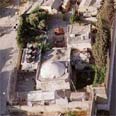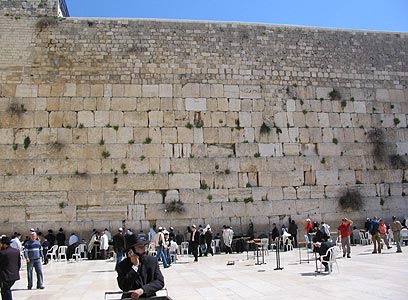
At least its mentioned: Joseph's Tomb in Nablus
צילום: לע"מ
Parshat Re'eh: No Jerusalem in Torah
Nablus and Mount Ebal are mentioned in the Torah, not Jerusalem or the Temple Mount. God chose not to tell us His chosen place, He even left it to us to decide where His place is. A word on free choice
Parshat "Re'eh" opens with an initiation to a mysterious world of faith and free choice: "See, I present to you today a blessing and a curse" (Deut. 12:26).
No explicit suggestion of a difference between good and bad, but near the end of the Torah the choice is made clearer: "I have placed life and death before you, blessing and curse. Choose life" (Deut. 30:19).
Much explanation is needed to decipher the oxymoron of faith and free choice; how could there be free choice under the heavy shadow of God's commandments, instructions that don't leave much to the imagination?
And what happens to someone who chooses to ignore God's preferences?
Alternative ideas
Against this background of the intrinsic tension between command and free will, between alternatives and requirements, it is interesting to consider some of the other ideas about free will hidden in our reading.
Our reading takes place during the waning days of the Israelites' wandering in the desert, on the eve of entering into the Promised Land.

Made holy by men, not God: Western Wall (Photo: Amir Peleg)
Moses addresses the nation, knowing deep down that this is his final address – God has decided to prevent his "illegal entry" into the land Moses had sacrificed so much for.
For it's part, the nation is already taking care of its own, present-day interests ahead of eternal concerns: "You shall not do like everything that we do here today – (rather,) every man what is proper in his eyes "(Deut. 12:8).
The first occupation
Moses explains to them the process by which they will enter, occupy and settle the Land: "And you shall cross the Jordan and settle in the land, and he will give you rest from all your enemies… It shall be that the place where the lord your God will chose to rest His name. There, you shall bring everything I command you… and you shall rejoice in the place that God will choose, among one of your tribes… there shall you do all that I command you" (Deut: 12: 10-14).
But where?
What is essentially written here? That sometime in the future, after crossing the Jordan and fighting several wars and obtaining national security, we will finally be able to rejoice… somewhere.
Where? It's not written. Which tribe? Don't know.
God's choice here is foggy, undefined. One utopian day in the future, He will pick a place. We don't know when that utopian day will come, or where that place will be.
Geographic God
This fog is not coincidental. After all, this week's reading opens up with another geographic description, one far more precise (it is also not by coincidence that one of the Hebrew names for God is "The Place"): "You should set the blessing on Mount Gerizim, and the curse on Mount Ebal" (Deut: 11: 29).
Someone who is able to so precisely identify the mountains surrounding the city of Nablus, to differentiate between a mountain of curse and a mountain of blessing, would have had little difficulty pointing out His chosen place - or the place he would one day choose – to "hang his hat," so to speak, in this world.
Unless he was trying to was a clear point.
Don't tell me Jerusalem
And please, let's not mention Jerusalem. Because Jerusalem is simply not mentioned. Anywhere in the Torah.
Only later did traditions arise about Jerusalem and its retroactive relationship to the Torah and the founding fathers.
But at the source, it is not mentioned. Nablus, yes. Jerusalem, no.
Gerizim and Eibal, yes. Temple Mount, no.
Our reading is the mother of vagueness: we are supposed to to make God an earthly "dwelling," but its address remains hidden.
Human sanctity
At the end of the day, and if truth be told, the sanctity of Jerusalem is the holiness of those people who sanctified it.
Generations of dreamers, longing for the holy city turned Jerusalem into the most important place, not only for us, but for many others as well.
And yet, it remains undeniable: Jerusalem's holiness does not stem from the Torah.
It was made holy later, and its main historical significance being the seat of King David's reign, as well as prophecy, legends and yearnings for millions of faithful, for thousands of years.
God's free will
So what does all this say about God's free will? Apparently God decided not to reveal either his choices or his chosen place.
Perhaps even more: God has left it to us, and the Biblical commentators, to decide just where His earthly home should be.
Our decision is God's free will.










